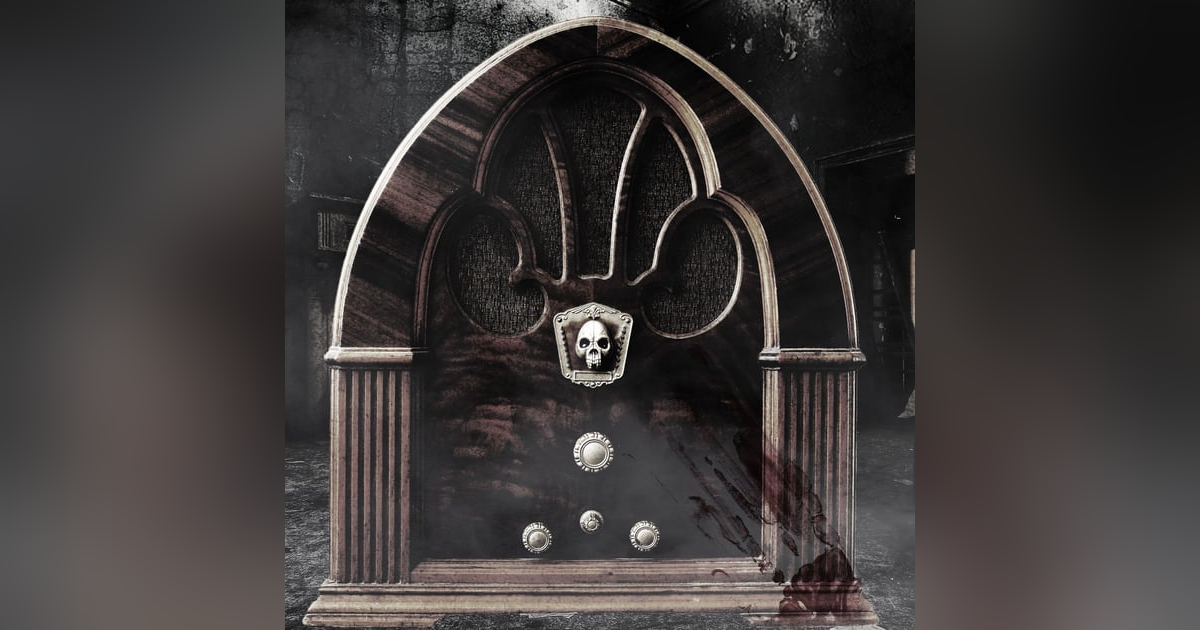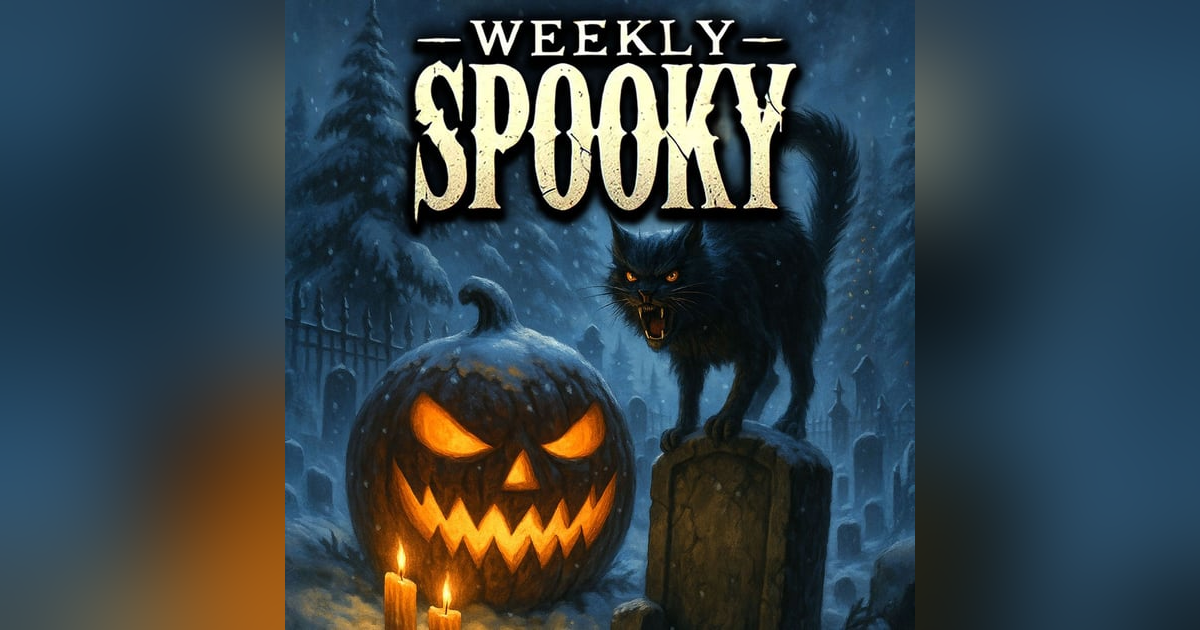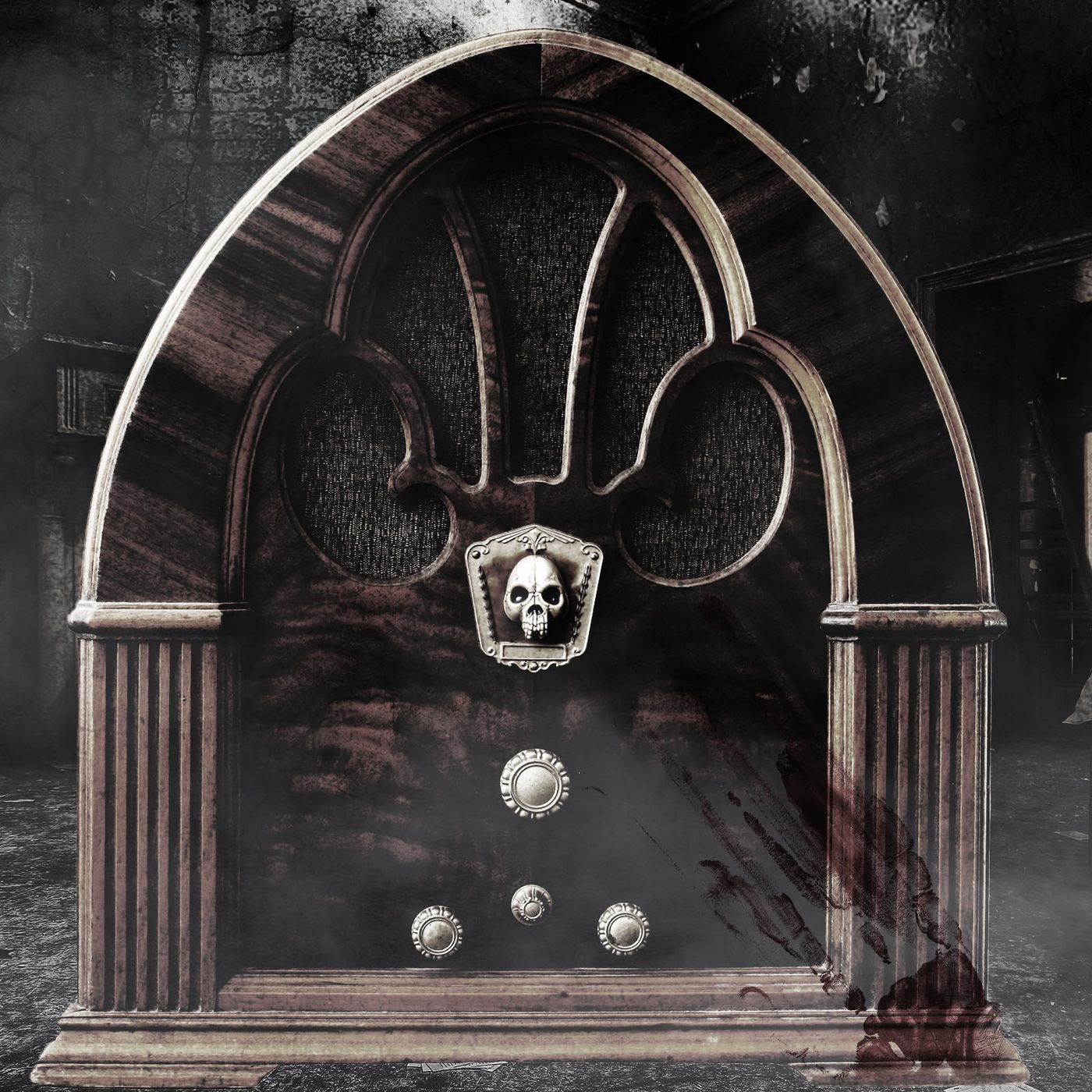Unknown Broadcast | "The Evil Eye" "The Evil Adelaide Winters" "Flee from Evil" "The Rising Sun"

In this episode, E.G. Marshall dives into the deep and often unsettling themes of evil, identity, and the darkness that can lurk within human nature. The narrative begins on a dark, cold evening, setting a foreboding tone. Marshall introduces the concept of evil, stating that it exists within us all and presenting a thought-provoking definition from the dictionary: anything that impairs happiness or welfare, depriving one of good. He challenges listeners to reflect on their own experiences, suggesting that anyone has the capacity for evil, igniting a philosophical exploration of morality and the human condition.
As the episode unfolds, we are treated to a dramatic reading titled "The Evil Eye," written by Elspeth Eric, featuring characters that exemplify both the creative struggle and the complex dynamics within relationships. The main character, Louise Bates, is introduced as a successful female writer grappling with her self-worth and the pressures of the literary world. Her frustrations boil over upon learning that her rival, Vanita Barlow, has received a lucrative book deal, sparking jealousy and dark thoughts within her. The tension escalates as Louise expresses a potential wish for harm towards those she perceives as threats to her success.
The story delves into the chaotic environment that Louise inhabits, highlighting her intense need for solitude and the lengths she goes to create. Her husband, John Bates, often becomes a victim of her creative demands and tumultuous feelings, showcasing the strain that ambition can place on personal relationships. Their interactions reveal a poignant dynamic between support and resentment, as John attempts to be the anchor in the chaos of Louise's artistic life, but often feels overwhelmed and inadequate.
In a turn of events, Louise receives devastating news about both Vanita Barlow and Stephen Bennett, another character whose desperation and connection to Louise's creative struggles lead to a dangerous spiral. The juxtaposition of Louise's artistic awakening against the backdrop of tragedy raises questions about the consequences of one’s ambitions, the ripple effects of jealousy, and the nature of evil itself. As Louise discovers her ‘power’ through her writing—a metaphorical ‘evil eye’—the boundaries between inspiration and destruction blur, suggesting that creators may wield more influence over their surroundings than they comprehend.
The episode blends elements of suspense and drama, as it weaves through themes of power dynamics in relationships and the existential crises that often accompany creative endeavors. As the finale approaches, we witness the ultimate manifestation of Louise's artistic struggle and the moral complexities that surround her choices, culminating in a chilling reflection on the ease with which one may stray into moral darkness.
Through Marshall's introspective narration, the audience is left pondering the deeper meanings of evil and the choices we make every day. The story challenges us to confront our own potential for darkness while weaving a cautionary tale about the costs of ambition, the fragility of human connections, and the thin line between creation and destruction.
🎧 LISTEN NOW and subscribe for spine-tingling horror stories every week!
🎉 Unlock exclusive bonus episodes and support the show on Patreon!
👉 WeeklySpooky.com/Join
📬 Contact Us / Submit Your Horror Story!
- Twitter: @WeeklySpooky
- Facebook: facebook.com/WeeklySpooky
- Email: WeeklySpooky@gmail.com
🎵 Music by Ray Mattis 👉 Check out Ray’s incredible work here !
👨💼 Executive Producers: Rob Fields, Bobbletopia.com
🎥 Produced by: Daniel Wilder
🌐 Explore more terrifying tales at: WeeklySpooky.com
1
00:00:09.519 --> 00:00:16.000
2
00:00:16.480 --> 00:00:24.440
3
00:00:24.480 --> 00:00:28.920
4
00:00:29.399 --> 00:00:36.640
5
00:00:38.520 --> 00:00:43.079
6
00:00:43.119 --> 00:00:49.679
7
00:00:49.759 --> 00:00:53.240
8
00:00:53.320 --> 00:00:58.359
9
00:00:58.399 --> 00:01:04.719
10
00:01:04.799 --> 00:01:05.400
11
00:01:23.519 --> 00:01:31.200
12
00:01:31.959 --> 00:01:34.359
13
00:01:34.400 --> 00:01:37.239
14
00:01:37.239 --> 00:01:39.799
15
00:01:40.239 --> 00:01:41.400
16
00:01:42.239 --> 00:01:46.200
17
00:01:46.640 --> 00:01:50.200
18
00:01:50.319 --> 00:01:53.400
19
00:01:53.439 --> 00:01:57.560
20
00:01:57.640 --> 00:02:01.560
21
00:02:01.719 --> 00:02:05.879
22
00:02:05.879 --> 00:02:08.719
23
00:02:08.759 --> 00:02:12.360
24
00:02:13.400 --> 00:02:15.800
25
00:02:15.439 --> 00:02:16.159
26
00:02:24.479 --> 00:02:28.240
27
00:02:28.319 --> 00:02:31.719
28
00:02:31.879 --> 00:02:41.439
29
00:02:43.719 --> 00:02:44.800
30
00:02:44.639 --> 00:02:47.199
31
00:02:47.719 --> 00:02:53.319
32
00:02:53.800 --> 00:02:57.439
33
00:02:57.479 --> 00:02:59.520
34
00:02:59.639 --> 00:03:03.159
35
00:03:03.280 --> 00:03:04.719
36
00:03:05.599 --> 00:03:08.479
37
00:03:08.639 --> 00:03:13.039
38
00:03:13.680 --> 00:03:19.000
39
00:03:19.840 --> 00:03:21.680
40
00:03:22.680 --> 00:03:25.319
41
00:03:26.400 --> 00:03:27.080
42
00:03:27.159 --> 00:03:31.599
43
00:03:32.120 --> 00:03:35.639
44
00:03:35.719 --> 00:03:39.919
45
00:03:40.039 --> 00:03:43.919
46
00:03:43.919 --> 00:03:48.360
47
00:03:48.400 --> 00:03:49.800
48
00:03:50.479 --> 00:03:51.120
49
00:03:51.759 --> 00:03:54.439
50
00:03:55.159 --> 00:03:57.840
51
00:03:59.159 --> 00:03:59.639
52
00:04:01.479 --> 00:04:06.800
53
00:04:07.240 --> 00:04:09.719
54
00:04:11.520 --> 00:04:12.159
55
00:04:12.360 --> 00:04:14.439
56
00:04:15.039 --> 00:04:15.919
57
00:04:17.600 --> 00:04:18.560
58
00:04:18.759 --> 00:04:20.399
59
00:04:20.439 --> 00:04:22.680
60
00:04:22.759 --> 00:04:25.759
61
00:04:25.800 --> 00:04:28.439
62
00:04:28.439 --> 00:04:28.680
63
00:04:28.920 --> 00:04:29.360
64
00:04:30.959 --> 00:04:35.120
65
00:04:34.959 --> 00:04:38.040
66
00:04:38.720 --> 00:04:40.040
67
00:04:40.040 --> 00:04:42.040
68
00:04:42.160 --> 00:04:43.920
69
00:04:44.199 --> 00:04:49.000
70
00:04:49.040 --> 00:04:50.079
71
00:04:50.360 --> 00:04:54.199
72
00:04:55.000 --> 00:04:56.000
73
00:04:55.879 --> 00:04:58.360
74
00:04:58.639 --> 00:05:01.680
75
00:05:02.439 --> 00:05:04.680
76
00:05:04.959 --> 00:05:06.000
77
00:05:06.079 --> 00:05:09.279
78
00:05:09.079 --> 00:05:13.079
79
00:05:13.079 --> 00:05:14.480
80
00:05:15.519 --> 00:05:18.920
81
00:05:18.959 --> 00:05:20.319
82
00:05:21.839 --> 00:05:22.120
83
00:05:23.279 --> 00:05:24.399
84
00:05:25.519 --> 00:05:26.959
85
00:05:27.759 --> 00:05:29.800
86
00:05:30.560 --> 00:05:31.560
87
00:05:31.639 --> 00:05:32.199
88
00:05:32.879 --> 00:05:34.480
89
00:05:34.879 --> 00:05:36.879
90
00:05:37.199 --> 00:05:37.360
91
00:05:38.360 --> 00:05:38.560
92
00:05:40.120 --> 00:05:41.120
93
00:05:41.120 --> 00:05:41.279
94
00:05:41.319 --> 00:05:41.560
95
00:05:41.600 --> 00:05:43.399
96
00:05:43.439 --> 00:05:44.160
97
00:05:44.879 --> 00:05:45.480
98
00:05:46.439 --> 00:05:48.240
99
00:05:48.360 --> 00:05:49.120
100
00:05:49.240 --> 00:05:49.920
101
00:05:50.199 --> 00:05:53.439
102
00:05:53.639 --> 00:05:55.720
103
00:05:56.360 --> 00:05:57.959
104
00:05:58.399 --> 00:05:59.920
105
00:06:00.439 --> 00:06:01.920
106
00:06:02.000 --> 00:06:02.160
107
00:06:02.199 --> 00:06:05.480
108
00:06:05.639 --> 00:06:07.240
109
00:06:07.319 --> 00:06:07.360
110
00:06:07.560 --> 00:06:09.120
111
00:06:09.519 --> 00:06:10.720
112
00:06:11.600 --> 00:06:12.360
113
00:06:12.399 --> 00:06:13.600
114
00:06:13.319 --> 00:06:16.120
115
00:06:16.800 --> 00:06:18.480
116
00:06:19.439 --> 00:06:21.439
117
00:06:21.720 --> 00:06:23.720
118
00:06:23.720 --> 00:06:23.879
119
00:06:23.920 --> 00:06:24.639
120
00:06:25.319 --> 00:06:27.560
121
00:06:27.639 --> 00:06:30.319
122
00:06:30.519 --> 00:06:33.519
123
00:06:33.560 --> 00:06:34.240
124
00:06:34.040 --> 00:06:36.199
125
00:06:36.360 --> 00:06:38.079
126
00:06:38.199 --> 00:06:40.959
127
00:06:41.000 --> 00:06:42.800
128
00:06:43.519 --> 00:06:45.079
129
00:06:45.560 --> 00:06:49.000
130
00:06:49.439 --> 00:06:53.920
131
00:06:55.000 --> 00:07:01.600
132
00:07:01.600 --> 00:07:03.160
133
00:07:03.360 --> 00:07:07.120
134
00:07:07.160 --> 00:07:09.720
135
00:07:09.920 --> 00:07:11.279
136
00:07:11.399 --> 00:07:12.639
137
00:07:12.720 --> 00:07:14.560
138
00:07:14.879 --> 00:07:17.439
139
00:07:18.000 --> 00:07:21.920
140
00:07:22.720 --> 00:07:24.000
141
00:07:23.959 --> 00:07:27.000
142
00:07:27.079 --> 00:07:27.839
143
00:07:27.959 --> 00:07:30.920
144
00:07:30.959 --> 00:07:36.319
145
00:07:36.319 --> 00:07:44.920
146
00:07:45.279 --> 00:07:49.160
147
00:07:49.399 --> 00:07:54.279
148
00:07:54.360 --> 00:07:59.399
149
00:07:59.600 --> 00:08:02.199
150
00:08:02.439 --> 00:08:05.920
151
00:08:05.959 --> 00:08:11.959
152
00:08:12.000 --> 00:08:14.360
153
00:08:14.439 --> 00:08:15.639
154
00:08:16.519 --> 00:08:18.480
155
00:08:18.319 --> 00:08:21.399
156
00:08:21.480 --> 00:08:22.800
157
00:08:22.879 --> 00:08:23.279
158
00:08:23.879 --> 00:08:28.399
159
00:08:28.560 --> 00:08:30.199
160
00:08:30.360 --> 00:08:33.080
161
00:08:33.200 --> 00:08:35.720
162
00:08:35.799 --> 00:08:38.120
163
00:08:38.120 --> 00:08:41.240
164
00:08:41.279 --> 00:08:42.519
165
00:08:43.080 --> 00:08:44.240
166
00:08:44.279 --> 00:08:46.360
167
00:08:46.440 --> 00:08:48.639
168
00:08:48.960 --> 00:08:49.919
169
00:08:49.919 --> 00:08:52.720
170
00:08:52.720 --> 00:08:54.039
171
00:08:54.519 --> 00:08:55.159
172
00:08:55.320 --> 00:08:58.200
173
00:08:58.440 --> 00:09:01.360
174
00:09:01.519 --> 00:09:02.519
175
00:09:02.960 --> 00:09:04.720
176
00:09:07.200 --> 00:09:07.919
177
00:09:08.159 --> 00:09:14.320
178
00:09:14.440 --> 00:09:19.799
179
00:09:19.919 --> 00:09:22.360
180
00:09:22.200 --> 00:09:23.840
181
00:09:24.120 --> 00:09:24.440
182
00:09:24.799 --> 00:09:26.480
183
00:09:27.120 --> 00:09:31.200
184
00:09:31.360 --> 00:09:34.120
185
00:09:34.759 --> 00:09:36.759
186
00:09:37.759 --> 00:09:39.320
187
00:09:39.679 --> 00:09:40.919
188
00:09:41.360 --> 00:09:41.879
189
00:09:41.960 --> 00:09:45.440
190
00:09:45.919 --> 00:09:47.559
191
00:09:47.080 --> 00:09:49.759
192
00:09:50.600 --> 00:09:51.919
193
00:09:52.919 --> 00:09:53.519
194
00:09:53.600 --> 00:09:54.279
195
00:09:54.440 --> 00:09:59.039
196
00:09:59.320 --> 00:09:59.720
197
00:10:01.759 --> 00:10:04.159
198
00:10:06.080 --> 00:10:10.120
199
00:10:10.879 --> 00:10:17.639
200
00:10:17.639 --> 00:10:18.279
201
00:10:18.279 --> 00:10:18.679
202
00:10:19.399 --> 00:10:22.840
203
00:10:23.120 --> 00:10:24.879
204
00:10:24.639 --> 00:10:25.399
205
00:10:32.200 --> 00:10:36.559
206
00:10:36.639 --> 00:10:39.600
207
00:10:39.879 --> 00:10:44.240
208
00:10:44.279 --> 00:10:44.799
209
00:10:45.120 --> 00:10:48.440
210
00:10:48.480 --> 00:10:50.000
211
00:10:49.720 --> 00:10:54.519
212
00:10:54.720 --> 00:11:01.720
213
00:11:02.519 --> 00:11:07.679
214
00:11:07.720 --> 00:11:09.159
215
00:11:11.639 --> 00:11:13.799
216
00:11:13.840 --> 00:11:17.320
217
00:11:17.480 --> 00:11:20.039
218
00:11:20.720 --> 00:11:25.960
219
00:11:26.080 --> 00:11:27.559
220
00:11:28.759 --> 00:11:33.159
221
00:11:33.200 --> 00:11:40.159
222
00:11:39.480 --> 00:11:42.639
223
00:11:43.120 --> 00:11:44.720
224
00:11:44.799 --> 00:11:46.519
225
00:11:50.600 --> 00:11:55.960
226
00:11:56.840 --> 00:12:00.960
227
00:12:03.679 --> 00:12:05.519
228
00:12:05.600 --> 00:12:11.000
229
00:12:11.559 --> 00:12:15.919
230
00:12:15.919 --> 00:12:17.120
231
00:12:18.440 --> 00:12:24.639
232
00:12:24.679 --> 00:12:31.440
233
00:12:31.759 --> 00:12:36.919
234
00:12:37.720 --> 00:12:42.000
235
00:12:44.360 --> 00:12:49.679
236
00:12:49.720 --> 00:12:51.440
237
00:12:51.480 --> 00:12:56.200
238
00:12:57.960 --> 00:12:59.120













